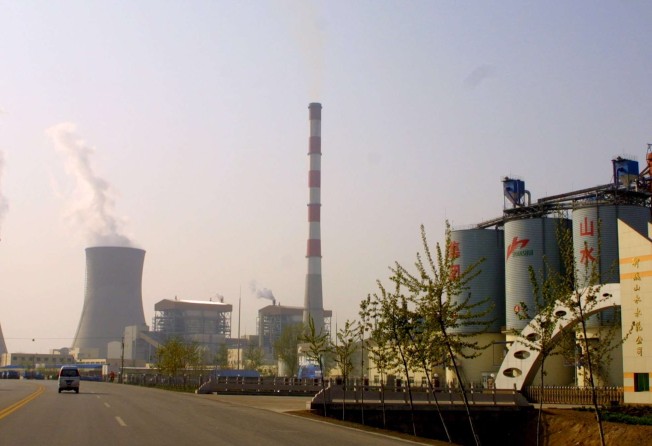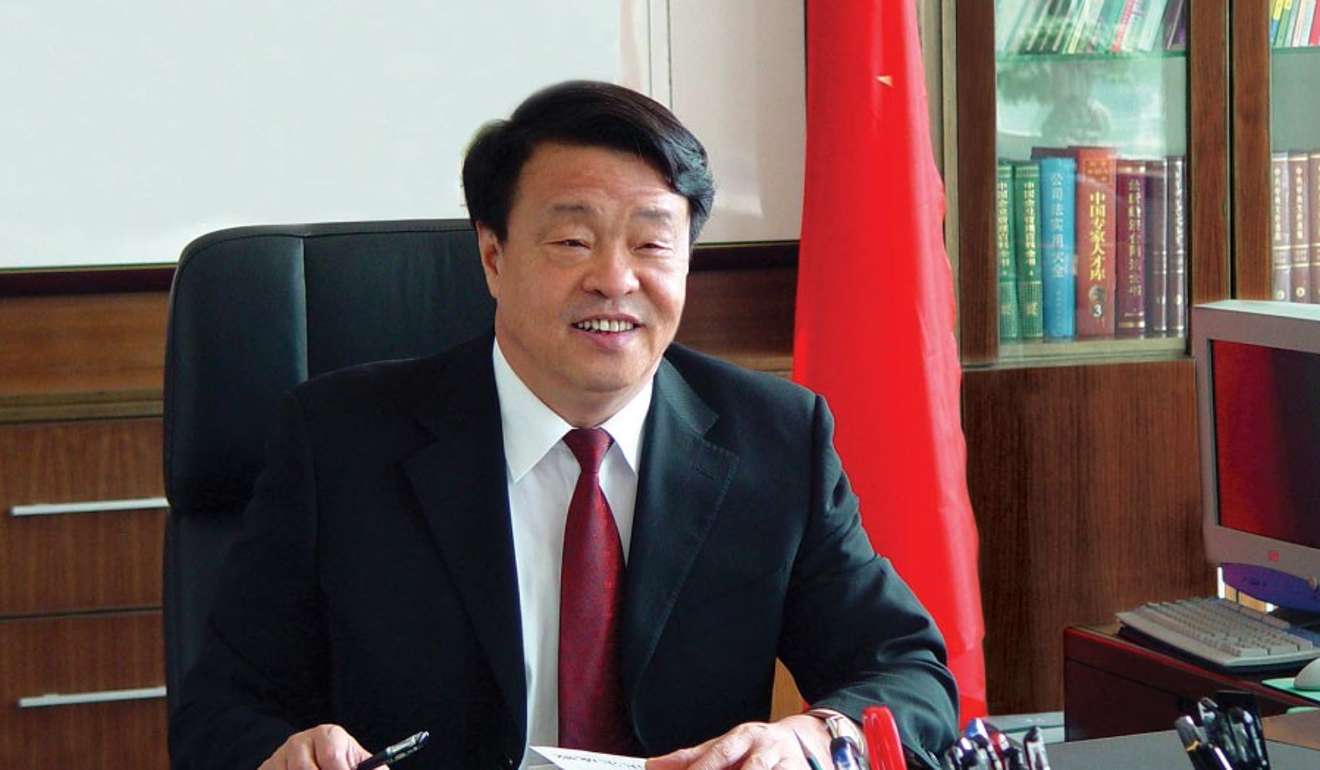
Shanshui feud a major distraction from recovering cement sector opportunities
The long-running battle for control of China Shanshui means it may miss out on a construction boom sparked by development of Xiongan New Area

The feud for control of China Shanshui Cement Group is going from bad to worse, distracting the country’s seventh-largest supplier of the building material from taking advantage of rising cement prices in northern China amid an expected construction boom from the establishment of President Xi Jinping’s dream city in Xiongan.
A tussle that began as early as 2014 took a turn for the worse last week, deteriorating into open confrontation involving hired thugs, the use of smoke bombs, pepper spray and water cannons, according to video clips circulated online.
The latest flash point is between management led by Mi Jingtian (宓敬田) and Shanshui’s board under its new controlling shareholder Tianrui Group.
Mi, who was picked by the Tianrui-led board in late 2015 to run Shanshui after a hostile takeover and ouster of the cement maker’s founder Zhang Caikui, has turned against his board.
At issue is a September 2016 plan by Shanshui’s new board to sell shares to institutional investors at HK$0.50 per share, a 92 per cent discount to the company’s last traded price.
The stock sale would raise only a modest sum compared to its huge overdue loans. While it would restore the minimum 25 per cent required public shareholding of the firm, it would dilute the stakes of all existing shareholders, with the 25 per cent held by the Shanshui management and employees cut to 19.6 per cent.

The existing shareholders are concerned about whether the new shareholders will be truly independent from Tianrui, as required by the share-placing agreement.
“We are highly suspicious that the placees will be linked to Tianrui and will help it realise its wish to increase its control over Shanshui and do things that will be detrimental to other shareholders’ interests,” said a spokesman for Shanshui’s minority employee shareholders, who would only give his surname as Wang.
Another fundraising plan floated last year by the board, under which existing shareholders would have been given the right to buy four new shares for every one owned, was also rejected by the employees.

The seeds of discontent at Shanshui were sewn years earlier.
Tianrui took over Shanshui in April 2015 through an accumulation of shares from the open market, by boosting its stake to 28.2 per cent from 10.5 per cent in the span of 10 days. The aggressive acquisition also boosted Shanshui’s stock price to HK$6.29, from HK$5.70, and shrunk the firm’s public shareholding to less than 10 per cent.
Acrimony and allegations flew as soon as Tianrui convened a new board at Shanshui. The new board alleged that deposed director Chen Xueshi had hired gangsters to destroy office property and assaulted staff. Shanshui’s management, still under the influence of founder Zhang despite his ouster, countered with a statement saying it was Tianrui’s new board that had illegally seized its factory and disrupted operations.
Zhang was subsequently deposed and Mi was installed as deputy general manager of Shandong Shanshui to run the production and sales.
Zhang put up a fight and had “illegally retained” the seals, chops, books and records and “disseminated inaccurate and misleading information” on the website of Shandong Shanshui for weeks, according to China Shanshui’s board.

Liu, China Shanshui’s chairman, told the South China Morning Post that the discount is “reasonable” given the company’s losses, liquidity problems, high indebtedness and trading halt of its shares.
Worries that the new shares will be sold to parties acting in concert with Tianrui is unfounded, he added, given the placing agreement stipulated that the shares be sold to independent professional investors.
Liu is managing director of transaction advisory services at EY’s Hong Kong office, and is a court-appointed receiver to administer China Shanshui Investment (CSI), one of the largest shareholders of China Shanshui Cement.
China Shanshui, listed in 2008, is 28.2 per cent owned by Tianrui, 25.1 per cent by CSI, 21 per cent by Taiwan-listed Asia Cement Corp and 16.7 per cent by state-backed listed China National Building Materials (CNBM).
CSI is majority owned by a trust representing over 4,000 employees with former chairman Zhang Caikui as trustee. The rest is held by a group of management shareholders including Mi.
Since 2014, multiple lawsuits had been filed in Hong Kong by Shanshui’s staff and former senior management shareholders over a share buyback scheme proposed by Zhang. The EY receivers were appointed as “interim custodians” while the CSI dispute is being resolved in court.
Godfrey Lam, a High Court judge, said in the February judgement that the receivers “have apparently not dealt with the concerns and objections expressed” through a letter signed by a large number of CSI shareholders on the proposed share placement.
He ordered the receivers to seek a four-week or longer adjournment of a February shareholders’ meeting for them to ascertain the position of the CSI shareholders, failing which, they must vote against the placement.
The proposed placement is also opposed by Zhang, according to the February judgement. Asia Cement and CNBM are also against it, their spokespeople told the Post.

Asia Cement requested a China Shanshui shareholders meeting during which they voted last month in favour of its proposal for an independent financial advisor to be appointed to advise all shareholders on the merits of the placement, after the full-year 2016 financial results are released.
“The move was a tactic to delay the shares placement,” Liu lamented, adding that trading resumption is key for Shanshui shareholders – particularly the minority ones - to realise any value of their shares.
Tianrui’s chief executive Li Heping has not responded to emailed questions and could not be reached by phone.
Shanshui’s board subsequently terminated the placement agreement, citing insufficient time to appoint a financial advisor and meet the agreement expiry date, and entered into a new placement agreement with the same terms. A shareholders’ meeting will be held in May or later to vote on the placement plan.
Meanwhile, Asia Cement late last month bought HK$128.8 million worth of Shanshui shares at HK$4.4 each from unidentified institutional investors via Goldman Sachs, raising its stake to 26 per cent, closer to Tianrui’s 28.2 per cent.
It also signed a memorandum of understanding to buy shares equivalent to 15.5 per cent of CSI that owns 25.1 per cent of Shanshui for HK$577.7 million from six CSI shareholders who were sacked from their management roles in Shanshui.
They have a “preferential right” to repurchase the shares at an undisclosed price stipulated in the agreement once Shanshui shares resume trading.
This came as industry profits surged and Shandong’s cement prices rose to a five-year high - up 74 per cent from early last year - on the back of better supply discipline.
“The cement sector’s recovery from the industry downturn has made it even more challenging for the major shareholders to compromise on relinquishing shareholding or management control, since each party would insist on a higher valuation for them to exit the company,” said Daniel Meng, head of China materials research at CLSA.